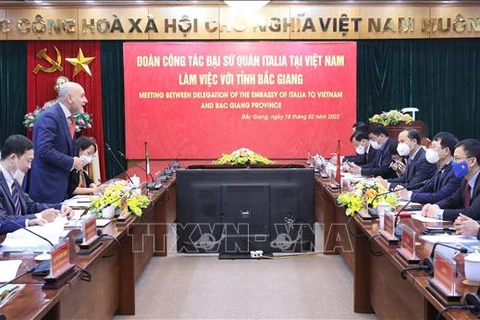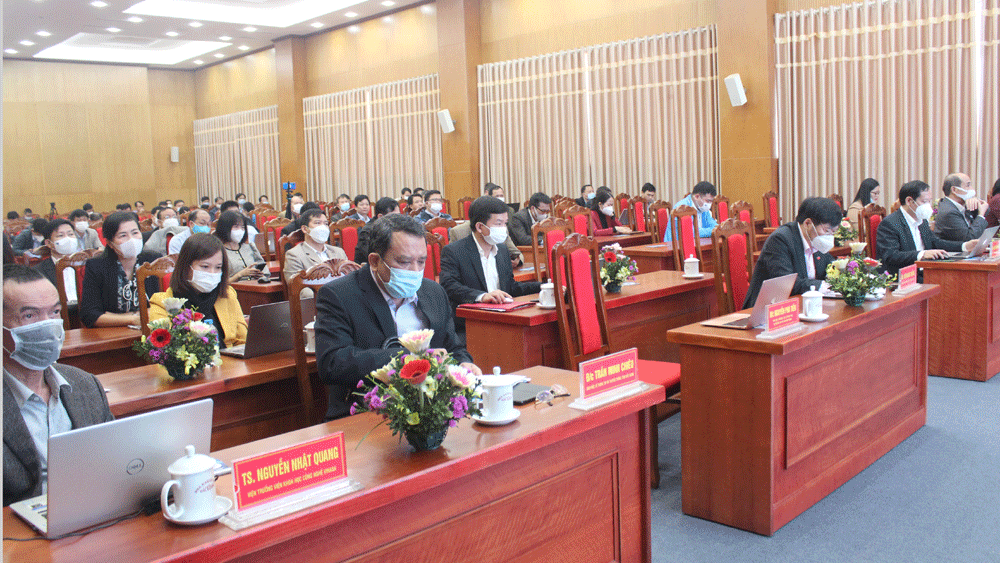Bac Giang (VNA) – Credit growth of the Vietnam Bank for Social Policies (VBSP)'s branch in the northern province of Bac Giang is expected to be between 7-10 percent in 2022, according to Vice Chairman of the provincial People’s Committee and head of the representative board of the branch's board of directors Phan The Tuan.
The branch has managed to maintain and improve the credit quality, and well control due and overdue debts.
It has also strengthened coordination with local authorities and entrusting units to collect overdue debts.
Meanwhile, socio-political organisations have also assisted the branch in monitoring and supervising grassroots-level savings and credit groups as well as borrowers in their management and use of loans, thus helping the bank promptly handle any arising problems and limitations.
According to Tuan, the branch lent 1.883 trillion VND (82.4 million USD) to 28,867 poor households and other social policy beneficiaries in 2021.
The total outstanding loans of the branch reached 5.39 trillion VND, up 16.5 percent year-on-year.
Of the total, 899 billion VND was lent to poor households and 916 billion VND to near-poor families; 805 billion VND to households in poor rural areas to build and upgrade clean water and sanitation works; 762 billion VND for business households in disadvantaged areas; 332 billion VND for job creation; 379 billion VND to employers; and 172.8 billion VND for social housing loans.
The bank has also taken timely solutions to support and remove difficulties for borrowers affected by the COVID-19 pandemic. It extended debts for 2,324 customers with total loans worth 72.8 billion VND, and provided new loans worth 930 billion VND to 21,537 others.
Last year, social policy loans in Bac Giang proven effective, helping more than 28,800 local poor households and other policy beneficiaries develop cultivation and husbandry, maintain stable jobs and increase incomes, and even escape from poverty, contributing to ensuring social security and promoting the new-style rural building movement in the locality.
In the coming time, the branch will closely follow the province's socio-economic development and sustainable poverty reduction goals, and take the new multi-dimensional poverty standards as a basis for considering capital needs of poor and near-poor households, those have just escaped poverty and other policy beneficiaries in the locality.
Representative boards of the branch's board of directors at district and city levels have strictly followed their operation regulations, and instructed relevant agencies to create favourable conditions for social policy credit activities in the locality, thus helping poor households and other policy beneficiaries get access to capital sources in a timely manner.
Bac Giang has also reaped fruitful outcomes in building new-style rural areas last year. The province achieved and surpassed most of the targets, ranking among the best performers in this regard in the northern mountainous region. More than 438 billion VND (nearly 19.3 million USD) from different sources was mobilised for the work.
The annual per capita income in rural areas increased to around 44 million VND while the household poverty rate based on the poverty line for the period from 2016 - 2020 dropped to 2.35 percent in 2021 from 3.5 percent in the previous year, local statistics show.
On the national scale, the Vietnam Bank for Social Policies lent over 80 trillion VND (3.52 billion USD) to more than 2 million poor households last year.
The bank said on January 13 that its loans have helped to generate jobs for more than 608,700 labourers, and enabled 1,357 businesses to restore operations and 37,500 students to continue their study.
As of December 31, 2021, its accumulative credit loans reached 256.32 trillion VND, up 22.7 billion VND from late 2020.
Meanwhile, its outstanding balance stood at 247.97 trillion VND, a rise of 9.6 percent./.

Bac Giang moves to promote sale of farm produce on e-commerce platforms
The northern province of Bac Giang will pay attention to developing e-commerce, expanding markets for agricultural products, especially typical ones, according to Deputy Director of the provincial Department of Industry and Trade Pham Cong Toan.
























